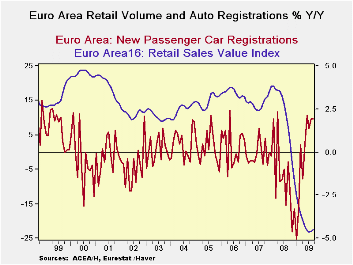 Global| Nov 05 2009
Global| Nov 05 2009Retail Sales Continue to Sag as Auto Registrations See Stimulus
Summary
Retail sales fell again in September in the e-Zone. Retail sales and vehicle registrations are on nearly opposite paths. Sales are still falling while vehicle registrations bolstered by an assortment of government programs have been [...]

Retail sales fell again in September in the e-Zone. Retail
sales and vehicle registrations are on nearly opposite paths. Sales are
still falling while vehicle registrations bolstered by an assortment of
government programs have been spurred higher. All this stirs the pot of
controversy since in the EU Commission indices that describe the
various EMU sectors, consumer confidence and retailing tend to show the
highest relative scores. Based on the EU surveys it would seem that
consumer attitudes and retailing are leading EMU ahead, yet in terms of
the hard data on spending that matter most that does not seem to be
true.
Partly this divergence is a question of looking at levels of
Vs changes. The levels of satisfaction assessed for the consumer and
retailing sector surveys by the EU Commission are high relative to
other sectors (though still low in absolute terms). For MFG and even
services the relative levels of the indices compared to normal times
are extremely low, but theses sectors had fallen hard in recession and
are now rising, or rising strongly as is the case with MFG and despite
their low ratings they are boosting growth the most.
So far European recovery seems to have come on the back of the
industrial sector with rising output and orders but from an extremely
low level. But with the euro currency also rising in value Vs other
currencies, much of this demand seems to have been foreign-sourced thus
questioning how far Europe can go without participation from its own
consumers. The string of declines in retail sales raises that question
again. It may be that the auto incentive schemes have diverted some
spending from retail sales. But the European recovery cannot be based
simply on selling autos and exporting. We continue to look for life in
retailing to give optimism to the view of a sustained euro-recovery.
| Euro Area Retail Sales | ||||||
|---|---|---|---|---|---|---|
| M/M | SAAR | |||||
| Sep-09 | Aug-09 | Jul-09 | 3-Mo | 6-Mo | 12-Mo | |
| Zone Total Value | -0.3% | -0.2% | -0.2% | -3.0% | -3.3% | -4.6% |
| Food,Beverages,Tobacco | -0.1% | -0.1% | -0.2% | -1.8% | -2.1% | -2.1% |
| Registrations: | ||||||
| Motor Vehicle Registration | 6.7% | -6.8% | 0.2% | -1.5% | 33.3% | 9.7% |
| Nonfood Country detail: Volume | ||||||
| Germany Value | -0.5% | -1.8% | 1.5% | -3.4% | -3.9% | -4.0% |
| UK (EU) Volume | 0.0% | 0.1% | 0.3% | 1.4% | 3.3% | 2.4% |
| The EA 13 countries are Austria, Belgium, Finland, France, Germany, Greece, Ireland, Italy, Luxembourg, the Netherlands, Portugal, Slovenia. | ||||||
Robert Brusca
AuthorMore in Author Profile »Robert A. Brusca is Chief Economist of Fact and Opinion Economics, a consulting firm he founded in Manhattan. He has been an economist on Wall Street for over 25 years. He has visited central banking and large institutional clients in over 30 countries in his career as an economist. Mr. Brusca was a Divisional Research Chief at the Federal Reserve Bank of NY (Chief of the International Financial markets Division), a Fed Watcher at Irving Trust and Chief Economist at Nikko Securities International. He is widely quoted and appears in various media. Mr. Brusca holds an MA and Ph.D. in economics from Michigan State University and a BA in Economics from the University of Michigan. His research pursues his strong interests in non aligned policy economics as well as international economics. FAO Economics’ research targets investors to assist them in making better investment decisions in stocks, bonds and in a variety of international assets. The company does not manage money and has no conflicts in giving economic advice.






